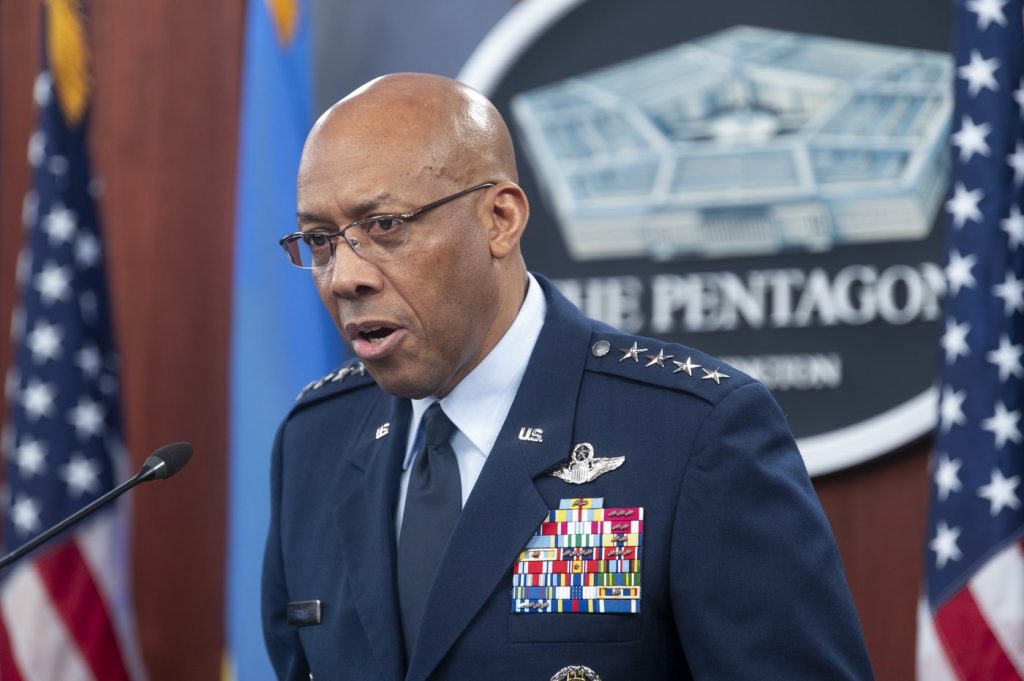WASHINGTON (AP) - In a surprising move, President Donald Trump dismissed Air Force General CQ Brown Jr. from his position as chairman of the Joint Chiefs of Staff on Friday, effectively sidelining a notable figure in U.S. military history. This decision is seen as part of a broader initiative led by Trump's defense secretary, Pete Hegseth, aimed at eliminating military leaders who are perceived to support diversity and equity.
General Brown, who made history as the second Black individual to hold the chairman role, faced significant challenges during his tenure, which lasted 16 months and involved navigating complexities related to the ongoing war in Ukraine and the increased hostilities in the Middle East. Trump expressed his gratitude to Brown on social media, acknowledging his 40 years of service and labeling him as an "outstanding leader." However, Brown's vocal support for movements like Black Lives Matter following the murder of George Floyd likely contributed to the administration's perception of him as part of a "woke" agenda in the military.
Additionally, Trump's administration is moving forward with plans to cut 5,400 civilian probationary positions and identify $50 billion in projected cuts for next year's budget, aiming to reallocate those funds toward Trump's agenda. In conjunction with Brown’s firing, Trump announced his intention to nominate retired Air Force Lieutenant General Dan "Razin" Caine as the new chairman. Caine, whose military background includes combat roles in Iraq and previous responsibilities at the CIA, does not meet certain statutory requirements for the position, such as having served as a vice chairman, combatant commander, or service chief. However, such prerequisites can be waived by the president for national interest reasons.
Alongside Brown, two more senior military officials were also let go: Chief of Naval Operations Admiral Lisa Franchetti and Vice Chief of Staff of the Air Force General Jim Slife. Admiral Franchetti becomes the second high-ranking female officer dismissed under the Trump administration, paralleling the swift removal of Coast Guard Commandant Admiral Linda Fagan shortly after Trump’s inauguration. She had a distinguished career, overseeing U.S. 6th Fleet and U.S. Naval Forces Korea, and was historically significant as the second woman promoted to four-star admiral.
General Slife, who previously led Air Force Special Operations Command, expressed disappointment in leaving but acknowledged the necessity of having military leaders trusted by both the president and the troops. Trump's approach during his second term has displayed a more forceful exercise of executive power, resulting in the removal of numerous officials from the Biden administration.
The role of chairman of the Joint Chiefs of Staff, established in 1949, serves as an advisory position to the president and the secretary of defense, meant to streamline military advice to the White House. Trump's decision to fire Brown comes despite expressions of support for him from key congressional members, as well as a seemingly amicable interaction between Trump and Brown at a recent Army-Navy football game in December 2023. However, speculation regarding these firings had been circulating on Capitol Hill, leading to a politically charged environment surrounding the Pentagon.
Democratic leaders in Congress criticized the firings as attempts to politicize the military, emphasizing the importance of maintaining a professional and apolitical military force. Senator Jack Reed, a Rhode Island Democrat and ranking member of the Senate Armed Services Committee, called for protections against efforts to turn the military into a partisan entity.
General Brown’s challenges during his term reflected broader issues regarding race and equality within the military. His public remarks on the societal implications of racial differences and his experiences as one of the few Black leaders in the armed forces garnered significant attention. Despite being confirmed by the Senate with overwhelming support, Brown's career faced hurdles, including being among over 260 senior military officers whose nominations encountered delays by Senator Tommy Tuberville of Alabama.
Brown’s legacy as chairman represented a momentous occasion, as both he and Secretary of Defense Lloyd Austin were Black, a historic first for the U.S. military leadership. This reflects ongoing discussions about racial diversity, equity, and inclusion within military ranks where only 9% of officers are Black, despite African Americans constituting 17.2% of active-duty service members.










